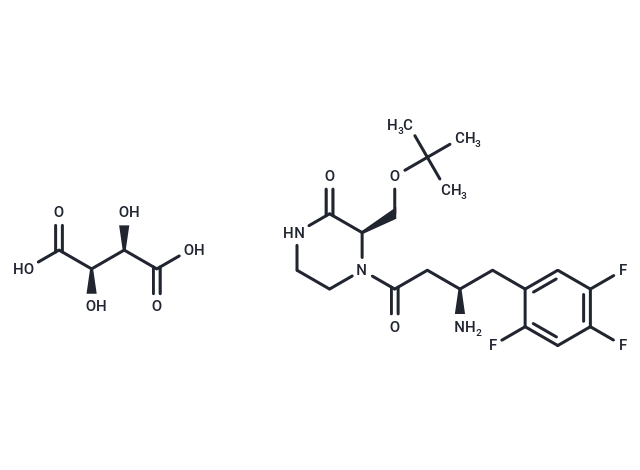Shopping Cart
- Remove All
 Your shopping cart is currently empty
Your shopping cart is currently empty

Evogliptin tartrate has potential for anti-atherosclerosis therapy that targets arterial inflammation. Evogliptin tartrate is a potent, orally bioavailable and selective dipeptidyl peptidase-4 (DPP-4) inhibitor, with antidiabetic activity.

| Pack Size | Price | Availability | Quantity |
|---|---|---|---|
| 5 mg | $508 | 6-8 weeks | |
| 25 mg | $2,000 | 6-8 weeks | |
| 50 mg | $3,600 | 6-8 weeks | |
| 100 mg | $6,900 | 6-8 weeks |
| Description | Evogliptin tartrate has potential for anti-atherosclerosis therapy that targets arterial inflammation. Evogliptin tartrate is a potent, orally bioavailable and selective dipeptidyl peptidase-4 (DPP-4) inhibitor, with antidiabetic activity. |
| In vitro | Evogliptin tartrate inhibits the TNF-α-mediated transcriptional activation of ICAM-1 and VCAM-1. Evogliptin tartrate inhibits inflammatory responses via suppression of adhesion molecules induced by TNF-α. And TNF-α-mediated activation of NF-κB is ameliorated by evogliptin via the interaction of NF-κB with SIRT1.Evogliptin tartrate significantly inhibits the TNF-α-mediated induction of ICAM-1 and VCAM-1 expression in a concentration-dependent manner (IC50 = 0.30 and 0.25 μM, respectively). |
| In vivo | Evogliptin tartrate inhibits the formation of atherosclerotic lesions by reducing vasoinflammation and increases plaque stability.Evogliptin tartrate (37.5-150 mg/kg; p.o.; daily; for 12 weeks) reduces the high-fat diet-induced atherosclerotic plaque area in the ApoE?/? mouse model. |
| Alias | DA-1229 tartrate |
| Molecular Weight | 551.51 |
| Formula | C23H32F3N3O9 |
| Cas No. | 1222102-51-3 |
| Relative Density. | no data available |
| Storage | Powder: -20°C for 3 years | In solvent: -80°C for 1 year | Shipping with blue ice. |

Copyright © 2015-2025 TargetMol Chemicals Inc. All Rights Reserved.